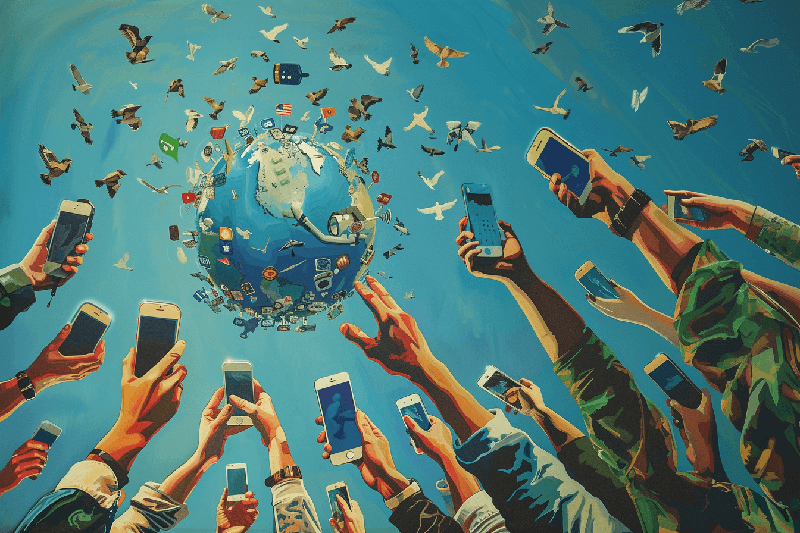Have you ever noticed how your social media feeds light up during major global events?
Whether it’s a big sports event, a political election, or a significant cultural moment, social media becomes a bustling hub of activity.
As someone who loves to stay updated during these events, I find it fascinating to see how engagement spikes and how people from all over the world come together online.
Let’s dive into the statistical analysis of social media engagement during global events, with some personal insights and friendly commentary along the way.

The Power of Global Events on Social Media
Increased Activity and Engagement
During global events, social media platforms see a surge in user activity.
People turn to platforms like Twitter, Facebook, and Instagram to share their thoughts, stay informed, and connect with others experiencing the same event.
- Twitter: Known for its real-time updates, Twitter often becomes the go-to platform during live events. For instance, during the 2020 US Presidential Election, Twitter reported over 1 billion tweets related to the election. According to Pew Research Center, Twitter’s usage spikes significantly during such events as users seek up-to-the-minute information.
- Facebook: Similarly, Facebook sees increased engagement during major events. During the COVID-19 pandemic, for example, Facebook reported a 50% increase in messaging across its platforms, including WhatsApp and Messenger, as people sought to stay connected and informed (Facebook Newsroom).
Personal Experience: The 2020 Tokyo Olympics
One of my favorite examples of social media engagement during global events was the 2020 Tokyo Olympics.
Despite the games being delayed by a year, the excitement was palpable online. I remember constantly checking Twitter for live updates, medal counts, and athlete highlights.
The hashtags #Tokyo2020 and #Olympics were trending throughout the event, and I found myself engaging with posts from people around the world, sharing in the triumphs and surprises of the games.
Key Statistics and Trends
Sports Events
Sports events, in particular, drive massive engagement on social media. Platforms like Twitter and Instagram become central hubs for fans to share their excitement, opinions, and reactions in real-time.
- Super Bowl: The Super Bowl is a prime example of this phenomenon. According to Statista, the 2021 Super Bowl generated over 80 million social media interactions across platforms. Fans shared everything from game highlights to reactions to commercials, making it one of the most engaging events of the year.
- World Cup: The FIFA World Cup also sees tremendous social media activity. During the 2018 World Cup, Facebook reported over 3 billion interactions (likes, comments, and shares) related to the tournament. Twitter recorded 115 billion impressions of World Cup tweets, showcasing the global reach and engagement of the event (Statista).
Political Events
Political events, such as elections and debates, are other significant drivers of social media engagement. Users flock to platforms to voice their opinions, share news, and participate in discussions.
- US Presidential Elections: The 2020 US Presidential Election saw unprecedented social media activity. Facebook reported a 55% increase in voter engagement campaigns compared to the 2016 election. Twitter’s daily user growth also spiked by 34% during the election period, reflecting the platform’s role in political discourse (Pew Research Center).
- Global Protests: Social movements and protests also catalyze social media engagement. The Black Lives Matter protests in 2020, for example, saw hashtags like #BlackLivesMatter and #BLM trending worldwide, with millions of posts shared daily across platforms. According to Statista, Twitter recorded over 8 million mentions of #BlackLivesMatter in just one week during the height of the protests.
The Role of Hashtags and Trends
Amplifying Engagement
Hashtags play a crucial role in organizing and amplifying social media engagement during global events. They help users find relevant content, join conversations, and increase the visibility of posts.
- Hashtag Campaigns: Brands and organizations often create specific hashtag campaigns to capitalize on global events. For example, during the Oscars, hashtags like #Oscars2022 and #RedCarpet become central to the conversation, driving engagement and participation from users worldwide.
- User-Generated Content: Hashtags also encourage user-generated content, which boosts overall engagement. During the COVID-19 pandemic, hashtags like #StayHome and #WithMe encouraged users to share their experiences and tips for coping with lockdowns, creating a sense of community and support online.
Personal Experience: Engaging with Hashtags
I’ve found hashtags incredibly useful during global events. During the Black Lives Matter protests, following hashtags like #BLM helped me stay informed and connected with the movement.
I discovered new perspectives, supported initiatives, and felt part of a larger community advocating for change.
The ability to join a global conversation through hashtags is one of the most powerful aspects of social media.
Challenges and Considerations
Managing Misinformation
While social media engagement during global events can be positive, it also comes with challenges, particularly regarding misinformation.
The rapid spread of false information can influence public perception and behavior.
- Combatting Fake News: Platforms like Facebook and Twitter have implemented measures to combat misinformation, such as fact-checking labels and removing harmful content. According to Pew Research Center, 64% of Americans believe that social media companies have a responsibility to prevent the spread of false information.
- User Responsibility: As users, it’s essential to verify information before sharing it. Engaging critically with content and relying on trusted sources can help mitigate the impact of misinformation during global events.
Future Trends in Social Media Engagement
Virtual and Augmented Reality
Looking ahead, virtual and augmented reality (VR/AR) technologies are set to transform social media engagement during global events.
These technologies can create immersive experiences, allowing users to participate in events in new and exciting ways.
- Virtual Events: Platforms like Facebook Horizon and VRChat are already experimenting with virtual events. Imagine attending a virtual concert or sports event, interacting with other fans in a digital space. This could revolutionize how we experience global events.
- Augmented Reality Filters: AR filters on Instagram and Snapchat are becoming more sophisticated, offering users interactive ways to engage with events. From trying on virtual merchandise to participating in AR games, these features can enhance user engagement.
Personal Experience: Exploring VR Events
I recently attended a virtual concert in VRChat, and it was a mind-blowing experience. Being able to interact with other attendees and enjoy the concert from different angles added a new dimension to the event.
It made me realize the potential of VR in transforming social media engagement during global events.
The Role of Social Media Algorithms
Enhancing Engagement
Social media algorithms play a significant role in determining what content users see during global events. These algorithms prioritize content that is likely to engage users, keeping them on the platform longer.
- Content Curation: Algorithms curate content based on user interests and engagement patterns. During global events, this means that users are more likely to see trending posts, live updates, and relevant discussions. According to Hootsuite, understanding these algorithms can help users and brands maximize their reach during peak engagement times.
Personal Experience: Algorithmic Influence
I’ve noticed that during major events, my social media feeds are dominated by related content.
For instance, during the Oscars, my Instagram Explore page was filled with red carpet looks and award highlights.
This curated experience kept me engaged and updated throughout the event.
Conclusion
Social media engagement during global events highlights the power of these platforms to bring people together, share information, and amplify voices.
Whether it’s a thrilling sports match, a significant political moment, or a cultural phenomenon, social media serves as a digital gathering place for millions worldwide.
By understanding the patterns and statistics behind this engagement, we can better appreciate the impact of social media on our collective experiences.
So, next time you’re glued to your screen during a big event, remember—you’re part of a vast, interconnected community sharing in the moment.




